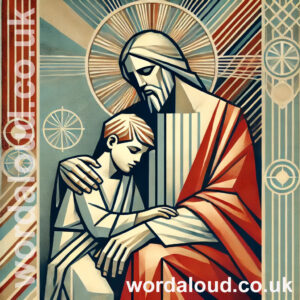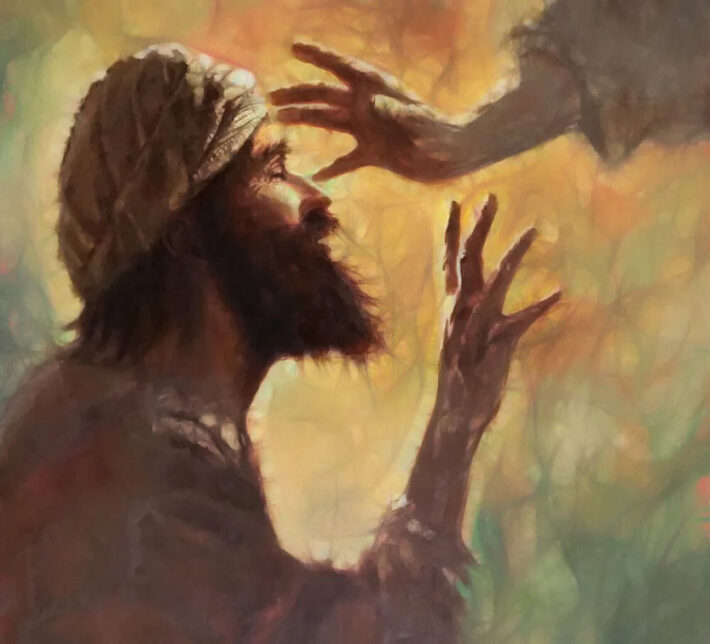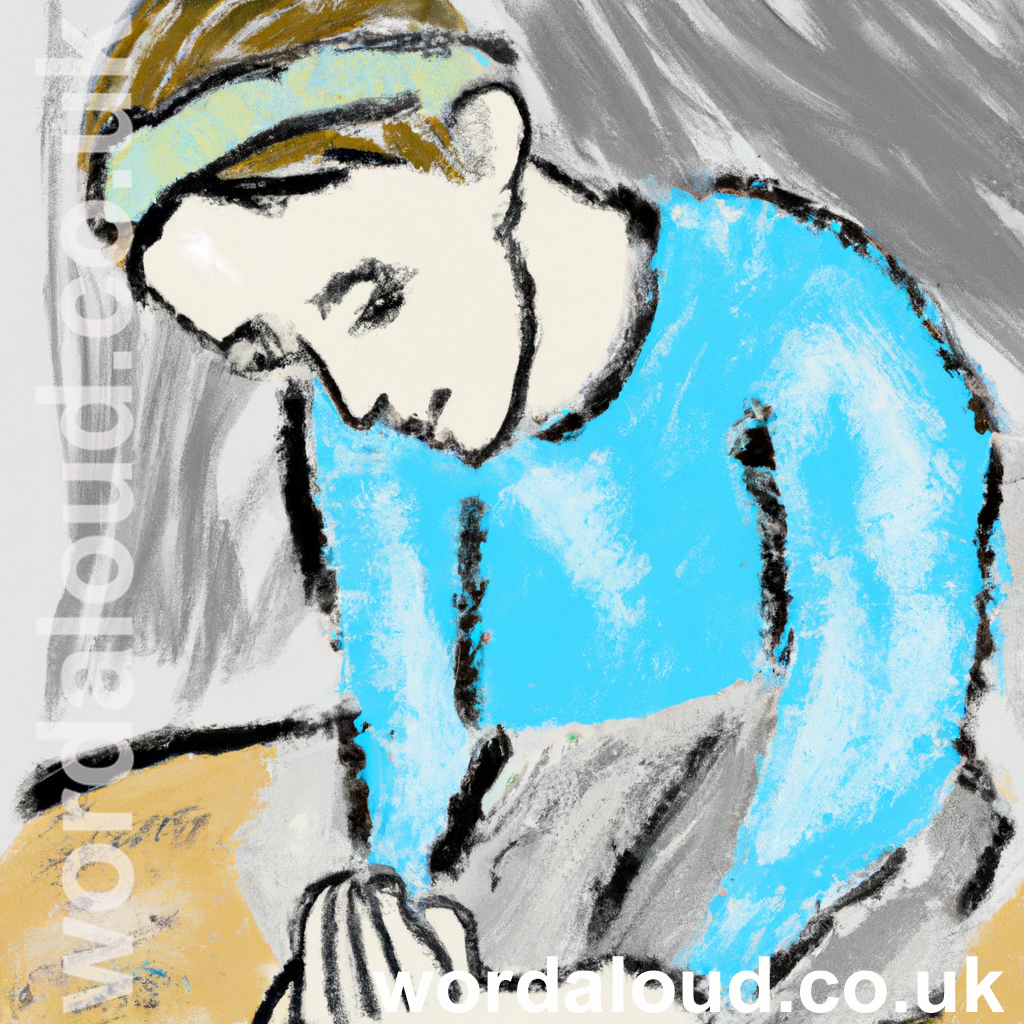Christian Art | Jesus Heals Bartimaeus, The Blind Man Of Jericho
Mark 10: 46-52 – 30th Sunday Year B, also Week 8 Ordinary Time, Thursday (King James Audio Bible KJV, King James Version, Spoken Word)
46 ¶ And they came to Jericho: and as he went out of Jericho with his disciples and a great number of people, blind Bartimæus, the son of Timæus, sat by the highway side begging.
47 And when he heard that it was Jesus of Nazareth, he began to cry out, and say, Jesus, thou Son of David, have mercy on me.
48 And many charged him that he should hold his peace: but he cried the more a great deal, Thou Son of David, have mercy on me.
49 And Jesus stood still, and commanded him to be called. And they call the blind man, saying unto him, Be of good comfort, rise; he calleth thee.
50 And he, casting away his garment, rose, and came to Jesus.
51 And Jesus answered and said unto him, What wilt thou that I should do unto thee? The blind man said unto him, Lord, that I might receive my sight.
52 And Jesus said unto him, Go thy way; thy faith hath made thee whole. And immediately he received his sight, and followed Jesus in the way.
The blind man, Bartimaeus, hears the noise of Christ’s passing and has to ask to find out what is happening. The clamour of the crowds following Jesus must have been striking and intense. This is a great, jubilant procession. Christ is passing by and too he is leading the way for us.
Bartimaeus hears that it is Jesus and he seizes his moment. He cries out to Jesus, and the people surrounding him try to hush him, to have him observe the proprieties, but the blind man will not be restrained. This is Jesus passing; this is Bartimaeus’s chance.
Jesus hears the blind man’s cries and calls him to him. Unrestrained, the blind man rushes to meet Jesus. Jesus asks him what he would like him to do for him. Jesus knows, of course, and yet he asks the question; he gives the invitation to Bartemaeus to be free, honest and open in his petitions to the Lord. And so, through his faith, the blind man is healed and follows Jesus.
When we sense Jesus passing, when we sense our opportunity, may we not be constrained by propriety, by fear, by the opinions of others; may we seize our moment and come to the light, our blindness healed by faith in Jesus.
‘Don’t you feel the same urge to cry out? You who are waiting at the side of the way, of this highway of life that is so very short? You who need more light, you who need more grace to make up your mind to seek holiness? Don’t you feel an urgent need to cry out, ‘Jesus, Son of David, have mercy on me’? What a beautiful aspiration for you to repeat again and again!’ St Josemaria Escriva
![]()

King James Audio Bible | Endnotes
Thy Faith Hath Made Thee Whole
The story of the healing of the blind man Bartimaeus in Mark 10:46-52 is a powerful testament to the transformative power of faith. This story, like many others in the Bible, reminds us of the importance of faith in our lives and how it can lead to profound spiritual healing.
In this story, Bartimaeus is a blind beggar who hears that Jesus is passing by. Despite being told to be quiet, Bartimaeus persists in crying out to Jesus for mercy, saying: ‘Jesus, thou Son of David, have mercy on me!’ (Mark 10:47) Jesus hears Bartimaeus and stops, asking what he wants. Bartimaeus replies: ‘Lord, that I might receive my sight.’ (Mark 10:51). Jesus responds: ‘Go thy way; thy faith hath made thee whole.’ (Mark 10:52) Immediately Bartimaeus is able to see.
This story is a powerful example of the importance of faith in our lives. As Jesus tells Bartimaeus, it was Bartimaeus’ faith that made him whole. Faith is not just a matter of believing in something; it is a matter of trusting in something greater than ourselves. It is a recognition that we are not in control of everything in our lives and that we need something greater than ourselves to guide us.
Throughout the Bible, faith is emphasized as a central aspect of spiritual life. Hebrews 11:1 defines faith as ‘the substance of things hoped for, the evidence of things not seen’. It is this faith that allows us to trust in God’s plan for our lives, even when we cannot see the path ahead of us.
There are numerous Bible passages that emphasize the importance of faith, including many in the Old Testament. For example:
- Genesis 15:6 – ‘And he believed in the Lord; and he counted it to him for righteousness.’ This verse refers to Abram (later renamed Abraham) and emphasizes the importance of faith in God’s promises. Abram believed in God’s promise that he would have descendants as numerous as the stars, and this belief was counted as righteousness.
- Habakkuk 2:4 – ‘Behold, his soul which is lifted up is not upright in him: but the just shall live by his faith.’ This verse emphasizes the importance of faith in living a just and righteous life.
- Psalm 37:5 – ‘Commit thy way unto the Lord; trust also in him; and he shall bring it to pass.’ This verse emphasizes the importance of trusting in God and committing one’s life to him.
- Isaiah 26:3 – ‘Thou wilt keep him in perfect peace, whose mind is stayed on thee: because he trusteth in thee.’ This verse emphasizes the peace that comes from trusting in God and keeping one’s mind focused on him.
- Proverbs 3:5-6 – ‘Trust in the Lord with all thine heart; and lean not unto thine own understanding. In all thy ways acknowledge him, and he shall direct thy paths.’ This well-known verse emphasizes the importance of trusting in God and relying on his guidance, rather than relying on one’s own understanding.
- Job 13:15 – ‘Though he slay me, yet will I trust in him: but I will maintain mine own ways before him.’ This verse emphasizes the importance of trusting in God even in the midst of difficulty and suffering.
The Church has emphasized the importance of faith throughout its history. Saint Augustine wrote that ‘Faith is to believe what you do not see; the reward of this faith is to see what you believe.’ This echoes the sentiments expressed in Hebrews 11:1 and emphasizes the importance of trusting in God’s plan, even when we cannot see it.
The Protestant Reformation placed great emphasis on faith. Martin Luther wrote that ‘faith is a living, daring confidence in God’s grace, so sure and certain that a man would stake his life on it a thousand times’. This again emphasizes the importance of trusting in God’s grace and recognizing that it is through faith that we are able to experience true spiritual healing.

![]()








